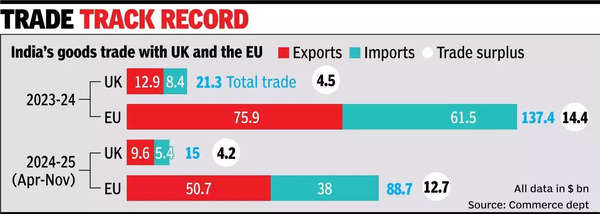NEW DELHI: Amid Donald Trump’s moves to redefine global trade rules, the resumption of negotiations for India’s free trade deals with the UK and the European Union later this month are seen as indications that India as well as its two trading partners are willing to moving ahead with the much-delayed agreements in a bid to overcome the impact of protectionist American policies.
Almost a year after negotiations had come to a halt, British minister of state for trade policy Douglas Alexander is scheduled to be in the Capital next week to restart the dialogue after elections in both countries.
Towards the month-end, a team from EU will arrive, following signs of a broad agreement on the direction of talks after commerce secretary Sunil Barthwal and commerce and industry minister Piyush Goyal held separate talks with their counterparts in Brussels, clearly articulating the need to recognise India’s development status and sensitivities. Besides, India wants EU to budget for non-tariff barriers and not just focus the talks on duty cuts.

The conclusion of the two deals can help India increase trade with these two crucial trade partners, although the talks with the EU are unlikely to be finalised in a jiffy, given the large membership of the trading bloc as well as the difficult ask in several areas.
The eagerness to move is visible on the Indian side too, which has dropped its resistance in some of the crucial areas. For instance, in the Budget, finance minister Nirmala Sitharaman agreed to revisit the model bilateral investment treaty, a major demand from the UK and EU.
Similarly, by cutting the levy on bourbon whiskey and some varieties of wine as well as bikes over the last fortnight, govt has signalled its willingness to other trade partners that it can lower duties in case it gets something in return. The latest duty cut on bourbon has also resulted in demands from the local industry to ensure that doors also open for Indian goods in overseas markets.
“Govt needs to safeguard the interests of Indian liquor manufacturers while deciding on issues related to customs duty cuts (basic customs duty and agriculture cess) and other concessions under FTAs. Though we have already recommended to govt to cut basic customs duty on spirits over a period of 10 years, we also want govt to ensure better international market access, especially the western countries, and safeguard interests of Indian companies against any dumping of products,” said Anant S Iyer, director general of the Confederation of Indian Alcoholic Beverage Companies, which represents domestic manufacturers.
